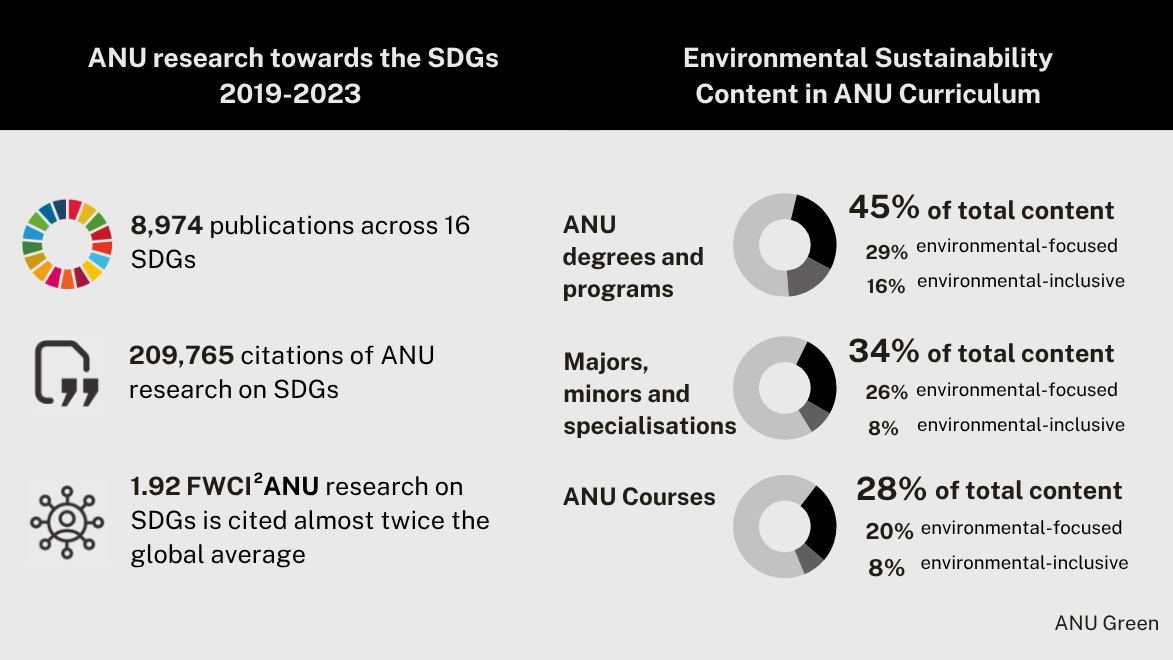
Thinking about what courses to take next year or planning a research project? Why not incorporate sustainability in your studies and gain real-world experience along the way?
Sustainability is embedded in teaching, research and operations at ANU, providing opportunities to our students to build knowledge and prepare to be the next generation of leaders. From climate action and clean energy to biodiversity conservation and sustainable cities, there are countless ways for you to engage with environmental challenges through courses, projects and internships in 2026.
ANU research addressing the SDGs
Between 2019 and 2023, ANU produced nearly 9,000 publications aligned with the UN Sustainable Development Goals (SDGs). These publications were cited more than twice the global average withed a field-weighted citation impact (FWCI) of 1.92. Our strongest contributions included:
- SDG 13: Climate Action – 1,080 publications, FWCI 2.22
- SDG 7: Affordable and Clean Energy – 1,210 publications, FWCI 1.80
- SDG 15: Life on Land – over 1,020 publications, FWCI 1.70
Read more about ANU research impact against the SDGs in the ANU Environmental Sustainability Report 2024.

1 In line with bibliometric best practice, a two-year citation window is required to allow sufficient time for citations. Data is therefore reported for publications from 2019-2023.
2 Field-Weighted Citation Impact (FWCI) compares the number of citations received by a publication to the global average for similar publications. A score of 1.00 represents the world average; values abvove 1.00 indicate higher-than-average impact.
Courses and project opportunities
Sustainability is embedded throughout the ANU curriculum, with 45% of degrees and programs incorporating environmental sustainability content. Some examples of ANU Schools and Colleges teaching sustainability in their courses, include:
- Fenner School of Environment and Society, leading interdisciplinary sustainability education, exploring how environment, policy and society intersect.
- Schools of Cybernetics and Engineering, and Research School of Earth Sciences, equipping future technologists and scientists to create sustainable solutions.
- Crawford School of Public Policy, integrating environmental considerations into policymaking.
- Colleges of Law and College of Business and Economics, exploring the legal, financial and management aspects of sustainability.
Read more about ANU teaching in environmental sustainability in the ANU Environmental Sustainability Report 2024.
Learning beyond the classroom
With a living lab approach, the ANU campus becomes a site for applied learning, connecting academic knowledge with real-world impact. ANU Green, the University's operational environmental sustainability program, collaborates with academic teams to create opportunities like internships and research projectsfor students to contribute to emissions reduction, biodiversity, circular economy initiatives and more.
Students can gain practical experience in areas such as:
- Transitioning energy systems from fossil fuels.
- Emission reduction programs across operational (e.g., fleet vehicles) and non-operational (e.g., travel and waste) sources.
- Creating a circular economy on campus.
- Monitoring and reporting environmental impacts.
- Community engagement in sustainability and climate action.
- Climate change risk and adaptation strategies.
- Landscape and biodiversity programs.
In 2024, Law and Economics student Zoe Jewell interned with ANU Green to prepare the University for the Federal Government’s mandatory climate risk disclosures. Zoe identified potential climate risk scenarios, including severe storms at the Acton campus and sea level rise at our Kioloa Coastal campus, and outlined procedures for assessments and adaptive action. You can read Zoe’s full report (PDF, 678 KB) for more detail.
“It was incredibly valuable to be exposed to the work of the [ANU Green] team and to learn how I could apply the skills from my degree to make a meaningful impact on sustainability at ANU,” Zoe said.
Internships like Zoe’s offer practical experience, supports the University's sustainability goals, and empowers students to shape a more climate-aware future.
Explore project ideas with ANU Green and talk to your convenor about how you might be able to include a project in your degree.
Want more options and flexibility? Check out the new SoCIETIE Initiative hosted at the ANU McCusker Institute, where they foster transdisciplinary collaboration to prepare students to tackle complex societal issues as engaged citizens. Every ANU student can participate to gain credit towards their degree. See the Programs and Courses website for more information.
Further study and professional development
Looking to expand your expertise and advance your career in sustainability? ANU offers postgraduate programs and short courses across a variety of fields, including climate or energy change, environmental management, agricultural innovation, sciences, business administration, philosophy and public health.
Professional short courses offered across ANU provide flexible, practical learning for those looking to advance their knowledge and careers. Explore courses through theContinuing Education website and see what suits your goals.
Embrace the opportunity to make a difference and tailor your program to contribute to a more sustainable future.
If you're interested in sustainability but don’t have room in your degree program, consider volunteering with ANU Green, or registering for One Small Step. The ANU One Small Step app makes sustainability activities fun and accessible and offers easy ways to become involved in sustainability on campus. You can also join the ANU Green Network to stay updated on environmental sustainability at ANU or check out the Buy Nothing ANU Facebook group, supported by ANUSA, to help reduce waste and support a circular economy.